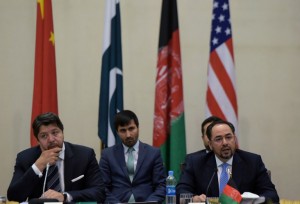
KABUL, Afghanistan (AFP) — Afghanistan expects a date for direct talks with the Taliban to be set by the end of February, the foreign minister told an international group seeking to relaunch the peace process at a meeting in Kabul Tuesday.
Delegates from Afghanistan, China, the US and Pakistan met in the capital for a fourth round of talks aimed at forming a path back to the nascent peace process, which was interrupted by last summer’s announcement that Taliban leader Mullah Omar had died.
Taliban representatives have been notably absent from the process so far.
“We want this group to draft the details of direct talks between the government of Afghanistan and the Taliban before the end of February,” foreign minister Salahuddin Rabbani told participants.
“To end the conflict and bloodshed in the country, the government of Afghanistan once again calls on Taliban groups to take part in peace talks,” Rabbani added.
The historic first round of direct talks with the Taliban took place in the Pakistani resort town of Muree last July, but came to a standstill after the insurgents confirmed Omar’s death, which had been kept secret for two years.
The announcement, and appointment of his successor Mullah Akhtar Mansour, accentuated divisions among the militants, with many holding Mansour responsible for lying to them about Omar’s death.
In 2015 a splinter group formed under Mullah Rasool and challenged Mansour’s leadership.
But the disunity has not dented the Taliban’s fighting ability.
The fresh peace initiative comes as the insurgents wage an unprecedented winter campaign of violence across Afghanistan, underscoring a worsening security situation more than 14 years after they were driven out of power by US-led NATO forces.
The first round of attempts to bring the militants back to the negotiating table began in Islamabad in January, followed by two more meetings in Afghanistan and Pakistan.
Also on Tuesday, President Ashraf Ghani announced he is replacing Rabbani as head the High Peace Council, the government body responsible for negotiating with the insurgents, without specifying the reasons.
Pir Sayyed Ahmad Gailani, an influential leader among the Pashtun who make up a large number of the Taliban, will take his place.
hs/st/rb
© 1994-2016 Agence France-Presse








